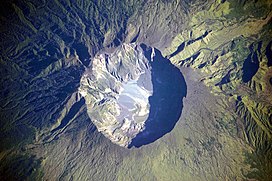| Mount Tambora | |
|---|---|
| Tomboro | |
 Caldera of Mount Tambora | |
| Highest point | |
| Elevation | 2,850 m (9,350 ft)[1] |
| Prominence | 2,722 m (8,930 ft)[1][2] |
| Coordinates | 8°15′S 118°0′E / 8.250°S 118.000°E |
| Geography | |
| Location | Bima & Dompu Regencies, Sanggar peninsula, Sumbawa, Lesser Sunda Islands, Indonesia |
| Geology | |
| Rock age | Late Pleistocene-recent |
| Mountain type | Trachybasaltic-trachyandesitic stratovolcano |
| Volcanic arc | Sunda Arc |
| Last eruption | 1967[1] |
| Climbing | |
| Easiest route | Southeast: Doro Mboha Northwest: Pancasila |
Mount Tambora, or Tomboro, is an active stratovolcano in West Nusa Tenggara, Indonesia. Located on Sumbawa in the Lesser Sunda Islands, it was formed by the active subduction zones beneath it. Before 1815, its elevation reached more than 4,300 metres (14,100 feet) high, making it one of the tallest peaks in the Indonesian archipelago.
Tambora violently erupted in a series of eruptions beginning 5 April 1815, culminating in the largest eruption in recorded human history and the largest of the Holocene (10,000 years ago to present). The magma chamber under Tambora had been drained by previous eruptions and underwent several centuries of dormancy as it refilled. Volcanic activity reached a peak that year, culminating in an explosive eruption. The explosion was heard on Sumatra island, more than 2,600 kilometres (1,600 miles) away and possibly over 3350 km (2060 miles) away in Thailand and Laos.[3] Heavy volcanic ash rains were observed as far away as Borneo, Sulawesi, Java, and Maluku islands, and the maximum elevation of Tambora was reduced from about 4,300 to 2,850 metres (14,110 to 9,350 feet). Although estimates vary, the death toll was at least 71,000 people.[4] The eruption contributed to global climate anomalies in the following years, while 1816 became known as the "year without a summer" because of the impact on North American and European weather. In the Northern Hemisphere, crops failed and livestock died, resulting in the worst famine of the century.
- ^ a b c "Tambora". Global Volcanism Program. Smithsonian Institution. Retrieved 24 June 2021.
- ^ "Gunung Tambora". Peakbagger. Archived from the original on 19 March 2007. Retrieved 2 August 2018.
- ^ Cite error: The named reference
:1was invoked but never defined (see the help page). - ^ Cite error: The named reference
Oppenheimer2003was invoked but never defined (see the help page).
